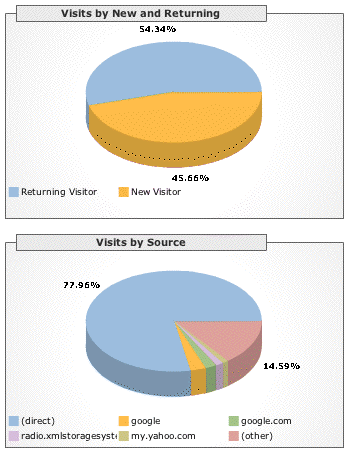
|
||||||||||||||||||||||||||||||||||||||||||||||||||||||
|
I've added a brief bio to the sidebar... The best part of the Useless Account writeup on TechCrunch is the useless windoid that pops up as you click the link. BBC: "Technology giant Apple has reached a deal with the Beatles to end the dispute over the use of the Apple name." YouTube has all of yesterday's Superbowl commercials. My favorites were the Coke ads, I had seen one of them at the movies last week. I also liked the Salesgenie.com ad, it was straightforward and corny, that's what I liked about it. Newly re-discovered, favorites from the Bonzo Dog Band. Tubas in the Moonlight. Ali Baba's Camel. Hunting Tigers. Wonderful stuff! On Friday I started using Google Analytics to track flow on this site. Already it's generating useful information, confirming something I believed was true.
Most of the traffic for this site is repeat visitors, and most of it is self-generated. In other words, some time ago a bunch of people started reading Scripting News through the day, bookmarked in some way, refreshed it periodically. The site doesn't get a lot of people pointing into it, there aren't a lot of ways to discover it. Aggregators and feed readers don't generate any traffic because the feed contains the full content. You can see this in the relatively low (for the traffic) Technorati rank.
For example, no doubt people in public radio would think some of the stuff I wrote on Saturday is arrogant, who does he think he is, what makes him so special, why does he think he's so smart. He really isn't that smart, he doesn't know anything about public radio, why should we listen to him? I'm like the guy who can see a truck coming, and you're standing in its path. Why do I see it? Because it hit me a number of years ago, and to the extent that I saw it coming, I ignored it, no one else seemed worried, so why should I? Bad strategy. The truck is coming anyway, might as well factor that into your thinking. And maybe I'm wrong, in which case listening won't hurt, might waste a little time, but then we waste so much time worrying about who he thinks he is and why should you listen, that a little more wasted time doesn't seem so bad.
They saw a truck coming, and they planned to hold their ground. Now, seven years later, it seems someone should ask, as Dr Phil might: How well did that work? I love public radio. I'm going to put that up on the screen while I talk. I love everything about public radio. That's why I want to see it kick ass in the new world where the former audience is using the public airwaves to communicate with each other. I want the pros in public radio to teach us how to do it, so there will be 100,000 public radio stations in the U.S. by the end of next year. Far-fectched? At one point people thought 100,000 blogs was a dream. |
Dave Winer, 51, pioneered the development of weblogs, syndication (RSS), podcasting, outlining, and web content management software. Former contributing editor at Wired Magazine, research fellow at Harvard Law School, entrepreneur, and investor in web media companies. A native New Yorker, he received a masters in Computer Science from the University of Wisconsin, a Bachelors in Mathematics from Tulane University and currently lives in Berkeley, California. "The protoblogger." - NY Times.
"Helped popularize blogging, podcasting and RSS." - Time.
"RSS was born in 1997 out of the confluence of Dave Winer's 'Really Simple Syndication' technology, used to push out blog updates, and Netscape's 'Rich Site Summary', which allowed users to create custom Netscape home pages with regularly updated data flows." - Tim O'Reilly.
Comment on today's
|
|||||||||||||||||||||||||||||||||||||||||||||||||||||
|
© Copyright 1997-2007 Dave Winer. Previous/Next |
||||||||||||||||||||||||||||||||||||||||||||||||||||||


 I think many times when you know something that other people don't -- it's simply because you're standing some place where you can see something that you can't see if you're standing somewhere else. It's not because one person is smarter, or somehow better than others, it's just a point of view that's making seeing possible.
I think many times when you know something that other people don't -- it's simply because you're standing some place where you can see something that you can't see if you're standing somewhere else. It's not because one person is smarter, or somehow better than others, it's just a point of view that's making seeing possible. In 2000 I naively thought the music industry wanted to know why its users were suddenly so
In 2000 I naively thought the music industry wanted to know why its users were suddenly so 
